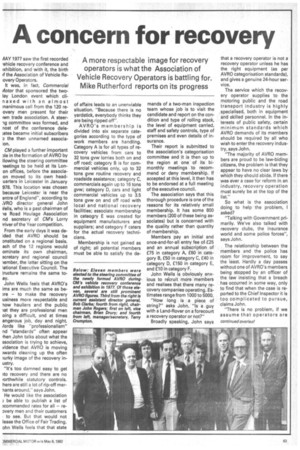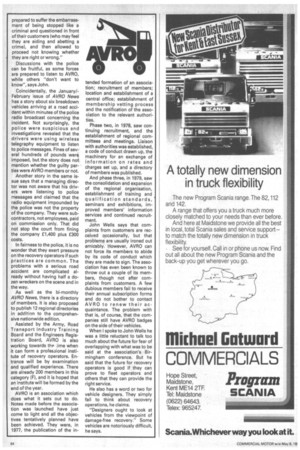A concern for recovery
Page 57

Page 58

If you've noticed an error in this article please click here to report it so we can fix it.
A more respectable image for recovery operators is what the Association of Vehicle Recovery Operators is battling for. Mike Rutherford reports on its progress
AAY 1977 saw the first recorded vhicle recovery conference and ixhibition, and with it, the birth If the Association of Vehicle Reovery Operators.
It was, in fact, Commercial &tor that sponsored the twolay London event which clinaxed with an almost inanimous call from the 120 reovery men present for their iwn trade association. A steerig committee was formed, and nost of the conference delerates became initial subscribers D the then unnamed associaIon.
CM played a further important ale in the formation of AVRO by 'lowing the steering committee ieetings to be held at its Lonon offices, before the associaon moved to its own headuarters in Leicester in January 978. This location was chosen because Leicester is near the entre of England", according to iVRO director general John dells, who is a past chairman of le Road Haulage Association nd secretary of CM's Lorry 'river of the Year competition. From the early days it was deided that AVRO should be onstituted on a regional basis. ach of the 12 regions would ominate its own chairman, ecretary and regional council lember, the latter sitting on the lational Executive Council. The tructure remains the same toay.
John Wells feels that AVRO's ims are much the same as be)re — to make the recovery usiness more respectable and now hauliers and the public let they are professional men oing a difficult, and at times angerous job, day and night. /ords like "professionalism" nd "standards" often appear rhen John talks about what the ssociation is trying to achieve, vidence that AVRO is moving swards cleaning up the often lurky image of the recovery inustry.
"It's too damned easy to get Ito recovery and there are no rorthwhile statutory controls. here are still a lot of rip-off merlents around," says John.
He would like the association ) be able to publish a list of :commended rates for all — reavery men and their customers to see. But that would not lease the Office of Fair Trading. ahn Wells feels that that state of affairs leads to an unenviable situation. "Because there is no yardstick, everybody thinks they are being ripped off".
AVRO's membership is divided into six separate categories according to the type of work members are handling. Category A is for all types of recovery vehicles from cars to 32 tons gvw lorries both on and off road; category B is for commercial vehicles only, up to 32 tons gvw routine recovery and roadside assistance; category C, commercials again up to 16 tons gvw; category D, cars and light commercial vehicles up to 3.5 tons gvw on and off road with local and national recovery facilities; associate membership in cateogry E was created for equipment manufacturers and suppliers; and category F caters for the actual recovery technicians.
Membership is not gained as of right; all potential members must be able to satisfy the de mands of a two-man inspection team whose job is to visit the candidate and report on the condition and type of rolling stock, the level of equipment carried, staff and safety controls, type of premises and even details of insurance.
Their report is submitted to the association's categorisation committee and it is then up to the region at one of its bimonthly meetings to recommend or deny membership. If accepted at this level, it then has to be endorsed at a full meeting of the executive council.
The association says that this thorough procedure is one of the reasons for its relatively small membership. It has some 800 members (200 of these being associates) but is concerned with the quality rather than quantity of membership.
Members pay an initial and once-and-for-all entry fee of£25 and an annual subscription of £75 in category A, £60 in category B, £50 in category C, £40 in category D, £150 in category E, and £10 in category F.
John Wells is obviously anxious to recruit more members and realises that there many recovery companies operating. Estimates range from 1000 to 5000.
"How long is a piece of string?" asks John. "Is a guy with a Land-Rover on a forecourt a recovery operator or not?"
Broadly speaking, John says that a recovery operator is not a recovery operator unless he has the right equipment (as per AVRO categorisation standards), and gives a genuine 24-hour service.
The service which the recovery operator supplies to the motoring public and the road transport industry is highly specialised, both in equipment and skilled personnel. In the interests of public safety, certain minimum standards which AVRO demands of its members should be required by all who wish to enter the recovery industry, says John.
"The majority of AVRO members are proud to be law-biding citizens, the problem is that they appear to have no clear laws by which they should abide. If there was ever a case for reform in an industry, recovery operation must surely be at the top of the list."
So what is the association doing to help the problem, I asked?
"Talking with Government primarily. We've also talked with recovery clubs, the insurance world and some police forces", says John.
The relationship between the members and the police has room for improvement, to say the least. Hardly a day passes without one of AVRO's members being stopped by an officer of the law insisting that a breach has occurred in some way, only to find that when the case is reported to the Chief Inspector it is too complicated to pursue, claims John.
"There is no problem, if we assume that operators are prepared to suffer the embarrassment of being stopped like a criminal and questioned in front of their customers (who may feel they are aiding and abetting a crime), and then allowed to proceed not knowing whether they are right or wrong."
Discussions with the police can be fruitful, as some forces are prepared to listen to AVRO, while others "don't want to know", says John.
Coincidentally, the January!February issue of AVRO News has a story about six breakdown vehicles arriving at a road accident within minutes of the police radio broadcast concerning the incident. Not surprisingly, the police were suspicious and investigations revealed that the drivers were using wireless telegraphy equipment to listen to police messages. Fines of several hundreds of pounds were imposed, but the story does not mention whether the guilty parties were AVRO members or not.
Another story in the same issue says that a managing director was not, aware that his drivers were listening to police messages and claimed that the radio equipment impounded by the police was not the property of the company. They were subcontractors, not employees, paid on commission only. That did not stop the court from fining the company £1,400 plus £300 costs.
In fairness to the police, it is no wonder that they exert pressure on the recovery operators if such practices are common. The problems with a serious road accident are complicated already without having half a dozen wreckers on the scene and in the way.
As well as the bi-monthly AVRO News, there is a directory of members. It is also proposed to publish 12 regional directories in addition to the comprehensive nationwide edition.
Assisted by the Army, Road Transport Industry Training Board and the Engineers Registration Board, AVRO is also working towards th ime when it can form a professional institute of recovery operators. Entrance will be by examination and qualified experience. There are already 200 members in this category (F), and it is hoped that an institute will be formed by the end of the year.
AVRO is an association which does what it sets out to do. Notes made before the association was launched have just come to light and all the objectives tentatively planned have been achieved. They were, in 1977, the publication of the in tended formation of an association; recruitment of members; location and establishment of a central office; establishment of membership vetting process and the notification of the association to the relevant authorities.
Phase two, in 1978, saw continuing recruitment, and the establishment of regional committees and meetings. Liaison with authorities was established, a code of conduct drawn up, the machinery for an exchange of information on rates and charges set up, and a directory of members was published.
And phase three, in 1979, saw the consolidation and expansion of the regional organisation, establishment of training and qualification standards, seminars and exhibitions, improved members' information services and continued recruitment.
John Wells says that complaints from customers are recceived occasionally, but that problems are usually ironed out amicably. However, AVRO can not force its members to abide by its code of conduct which they are made to sign. The association has even been known to throw out a couple of its members, though not after complaints from customers. A few dubious members fail to receive their annual subscription forms and do not bother to contact AVRO to renew their acquaintance. The problem with that is, of course, that the companies still have AVRO badges on the side of their vehicles.
When I spoke to John Wells he was a little reluctant to talk too much about the future for fear of overlapping with what was to be said at the association's Birmingham conference. But he said that the future for recovery operators is good if they can prove to fleet operators and others that they can provide the right service.
He also has a word or two for vehicle designers. They simply fail to think about recovery operations, he claims.
"Designers ought to look at vehicles from the viewpoint of damage-free recovery." Some vehicles are notoriously difficult, he says.




























































